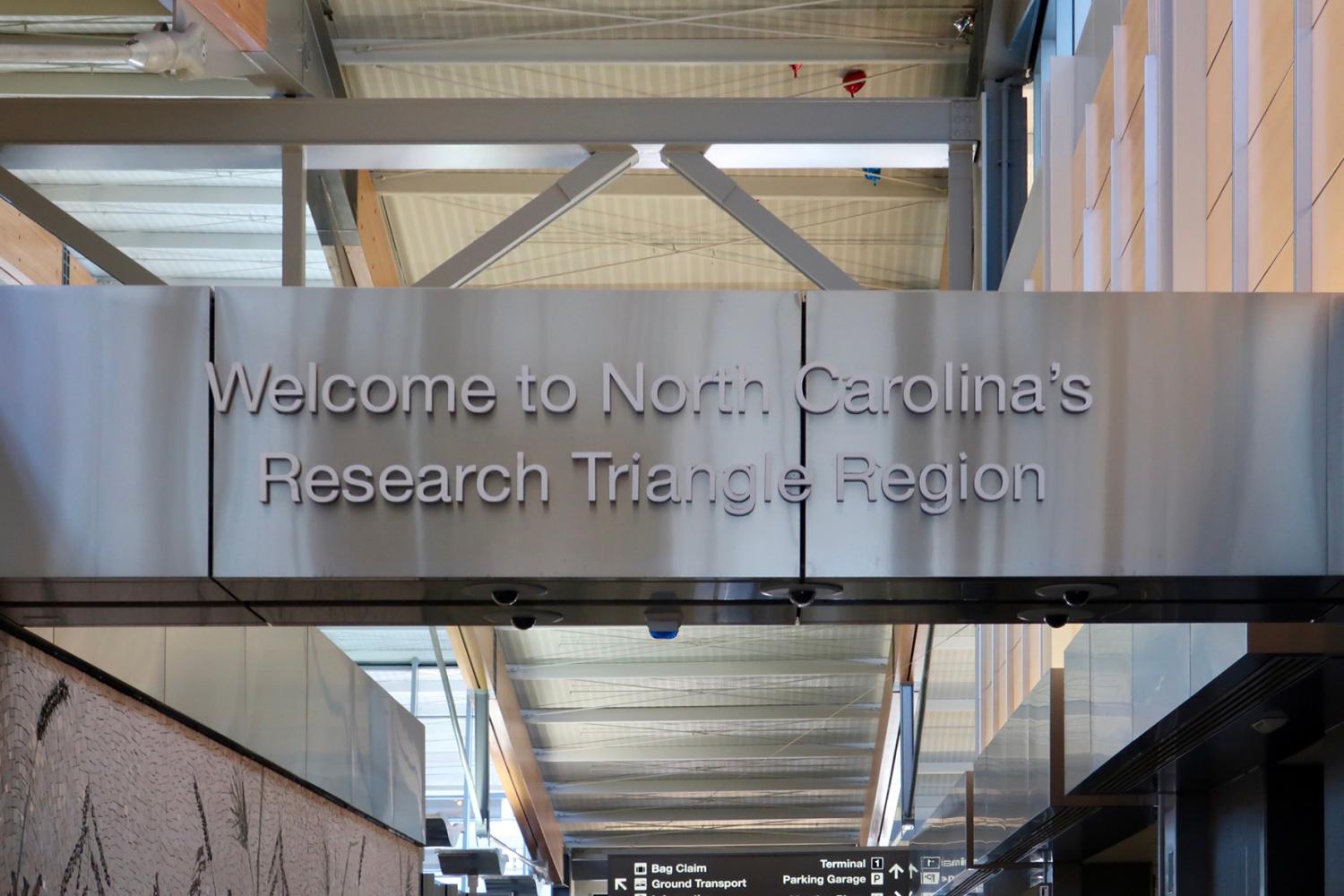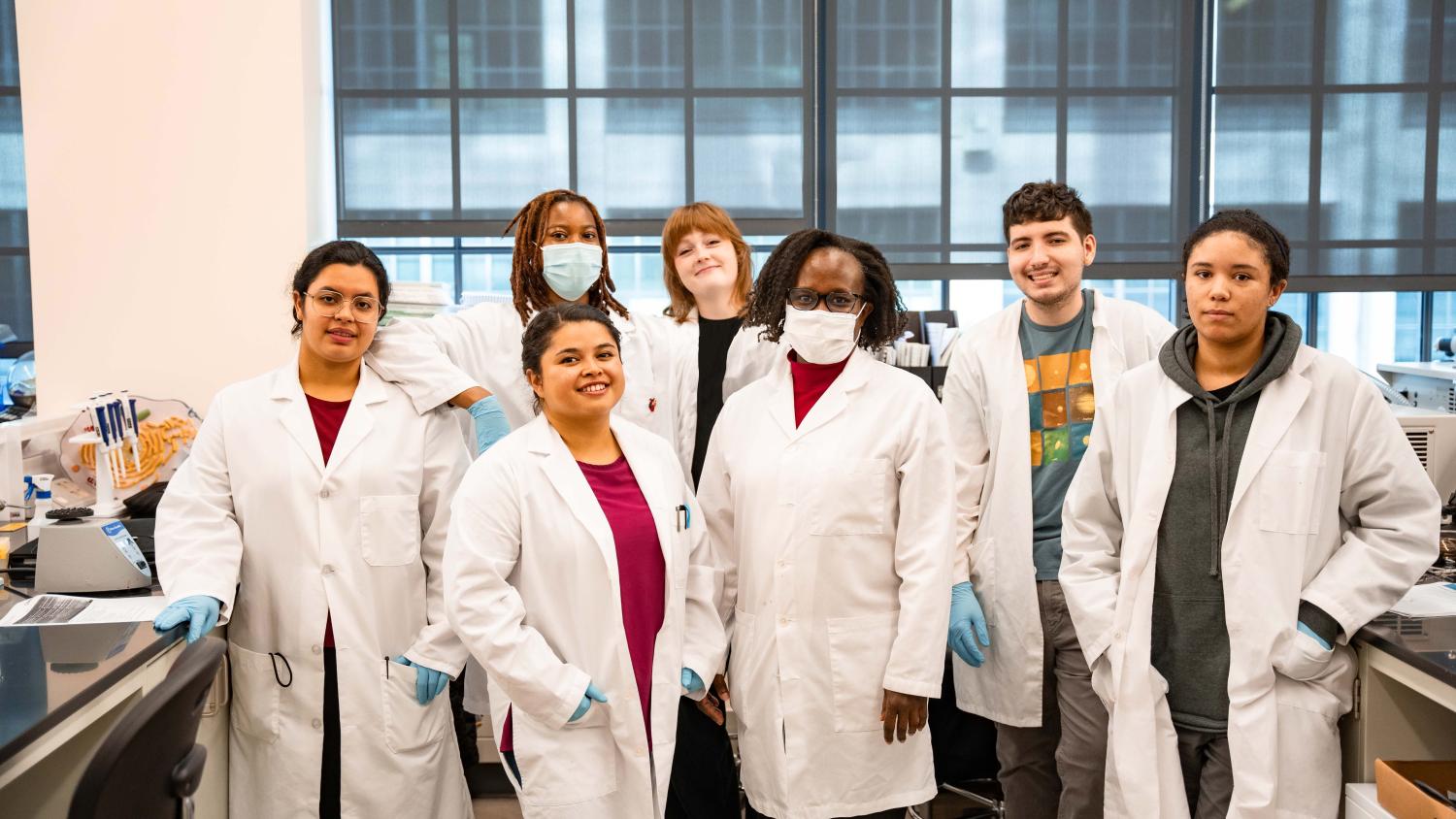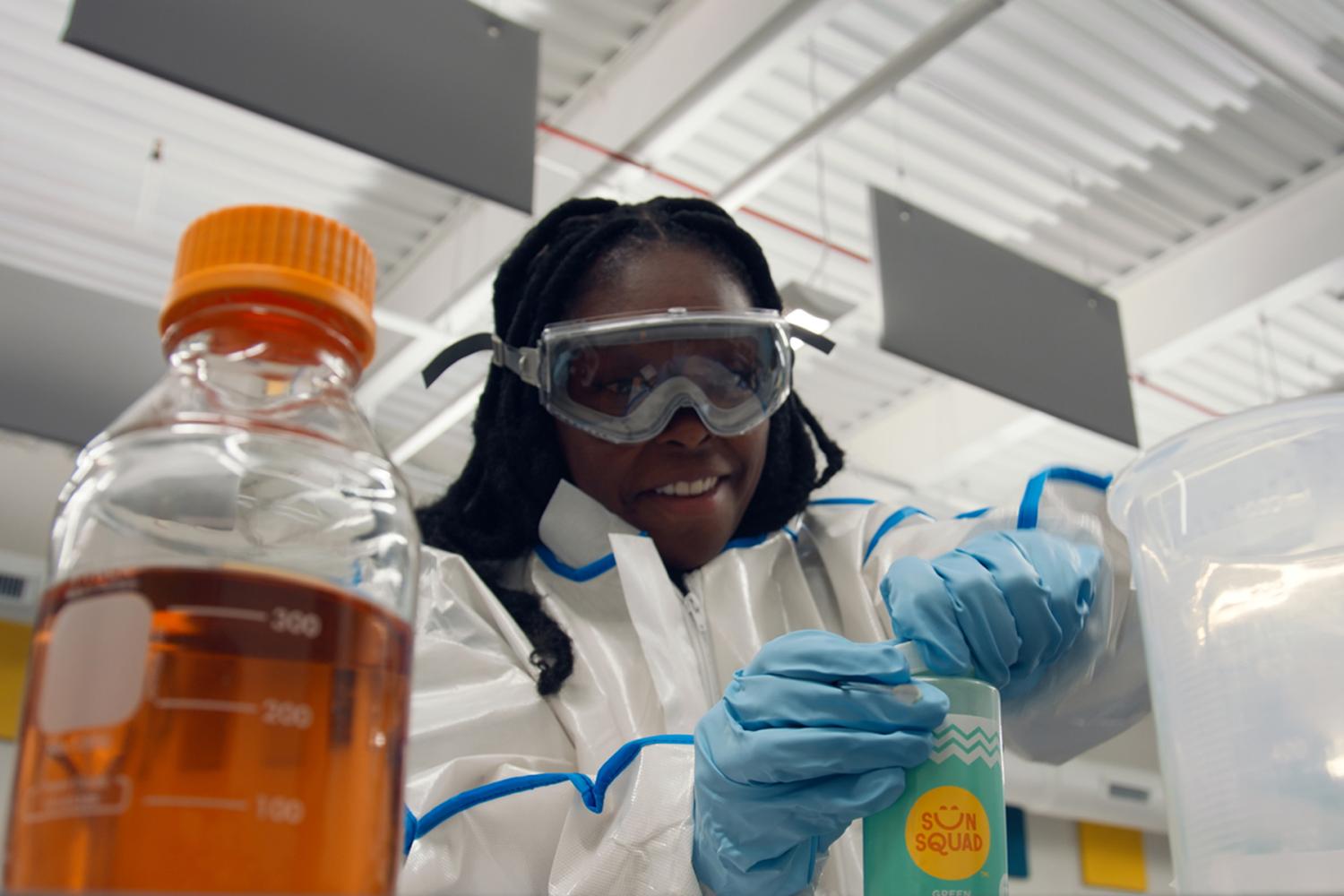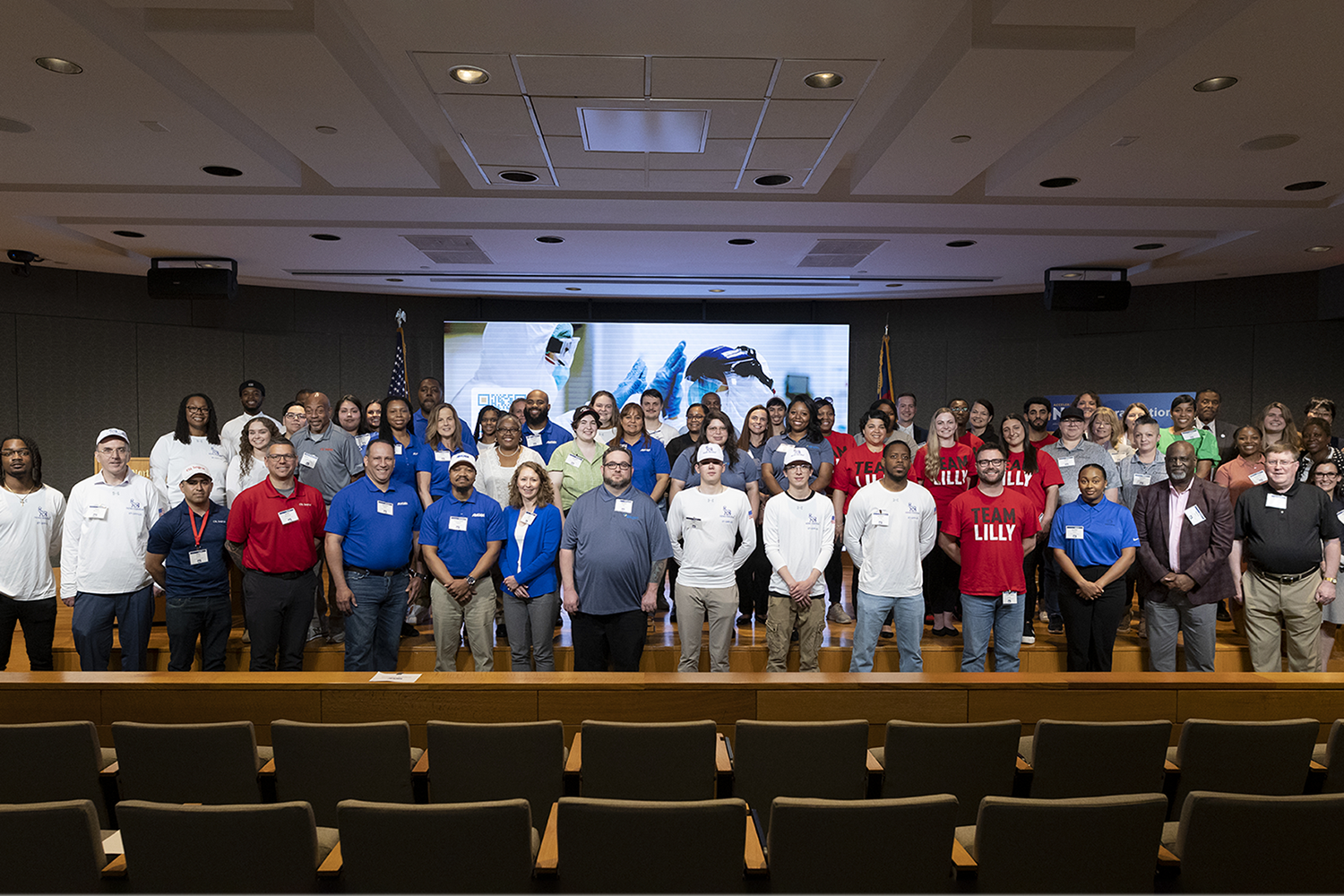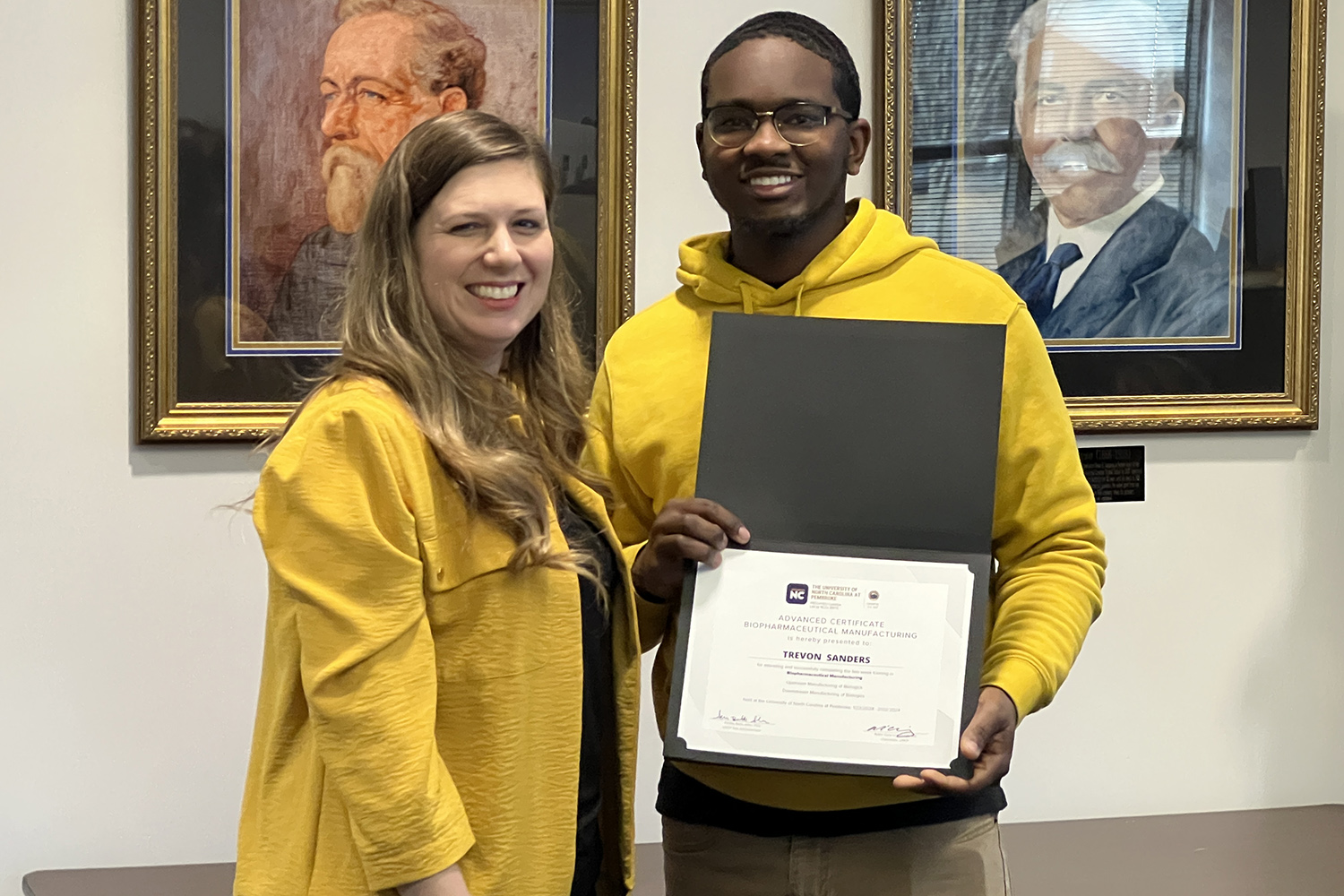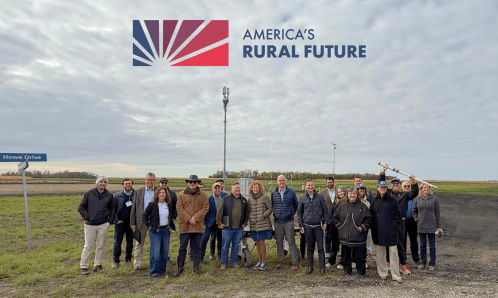The one-minute version of this case study
- North Carolina’s life sciences cluster is booming. Over the past four decades, North Carolina—anchored by the Raleigh-Durham region—has grown a world-beating cluster of life sciences research and manufacturing. Between 2020 and 2022, life sciences companies committed to invest $9.1 billion and create 12,500 new jobs across the state, including jobs in biopharmaceutical manufacturing that do not require a four-year degree.
- North Carolina’s core challenge—and opportunity—is matching talent to these jobs. Currently, life sciences companies are struggling to identify and recruit the workforce necessary to meet this demand. As a result, the industry is poaching talent from each other or recruiting workers from outside of the state to fill job openings. Meanwhile, thousands of North Carolinians could benefit from these jobs but are unaware that they exist or do not have a way to access training programs.
- The Build Back Better Regional Challenge (BBBRC) is helping North Carolina invest in a more diverse talent pipeline. The Accelerate NC – Life Sciences Manufacturing coalition’s $25 million BBBRC strategy is the story of a region trying to avoid the highly unequal outcomes present in most of America’s major technology hubs by investing in a more robust homegrown biotech talent pipeline and ensuring that underserved and historically excluded communities have awareness of and access to these opportunities.
- For an innovation cluster to evolve toward equity, it requires much more than job training. This case study explores the design and implementation of Accelerate NC’s wide-ranging life sciences talent development strategy, including the expansion of entry-level biopharmaceutical trainings in partnership with community colleges and minority-serving institutions; the creation of ambassadors and other inclusive outreach initiatives; and strategic employer engagement across the sector. It offers lessons on how workforce partners can use creative and tailored outreach, awareness-building, and industry engagement strategies to form a more equitable innovation cluster.
Before reading this case study: What is the Build Back Better Regional Challenge?
This brief overview of the program provides useful context before reading this case study.
In July 2021, the Economic Development Administration (EDA) launched the $1 billion Build Back Better Regional Challenge (BBBRC) through a Notice of Funding Opportunity that outlined a two-phase competition.1 Through its Phase 1 activities, the EDA issued an open call for concept proposals that outlined a high-level vision for a “transformational economic development strategy.” The thesis was that regions would identify an industry cluster opportunity; design “3-8 tightly aligned projects” to support that cluster; build a coalition to “integrate cluster development efforts across a diverse array of communities and stakeholders”; and ensure that these collective efforts advance equity by supporting economically disadvantaged communities.2
In Phase 1, 529 coalitions submitted high-level concept proposals that outlined a vision for the cluster, a high-level description of potential projects, and the key institutions involved in the coalition. After receiving Phase 1 concept proposals, the EDA undertook two months of review to determine which coalitions would be awarded $500,000 technical assistance grants and invited to apply for Phase 2 funding. Those resources enabled a hyper-intensive planning sprint between December 2021 and March 2022. During this period, each of the 60 finalist coalitions expanded their five-page concept proposal into an overview narrative and project proposals that outlined their approach, key assets and institutions, the portfolio of projects and their expected outcomes, and matching resources to complement the EDA grant.
Ultimately, the 60 coalitions submitted funding requests well beyond the BBBRC’s $1 billion allocation. The average Phase 2 funding request submitted to EDA was approximately $75 million, while the average award amount available in the competition budget was approximately $50 million. Given this gap, in May 2022, all 60 applicants were offered the opportunity to prioritize funding through a budget request reduction process after applications were received. Then, an Investment Review Committee (IRC) assessed all completed applications and made recommendations. In some cases, the EDA ultimately selected a subset of component projects for funding or funded component projects at a reduced level, requiring applicants to modify projects during the award process. In September 2022, the EDA selected 21 of the 60 coalitions for implementation awards, ranging in size from $25 million to $65 million, to be spent over a five-year period.
Background
North Carolina—led by the Raleigh-Durham region—is widely regarded as one of America’s leading 20th century regional economic development success stories. At the century’s midpoint, North Carolina ranked 49th among states in per capita income, owing to a reliance on three “T” industries—tobacco, textiles, and timber-powered furniture manufacturing—that were rapidly being automated and offshored. Nearly 75 years later, the state has a global foothold in life sciences, finance, and advanced manufacturing. Since 1969, real per capita income in the Raleigh-Durham-Cary area has grown by over 230%—the fourth-highest growth rate of all U.S. metropolitan regions with populations greater than 1 million.
Government, industry, higher education, and philanthropy—working together—catalyzed this economic transition. In the mid-1950s, Governor Luther Hodges and a group of business and university leaders originated the idea for a 7,000-acre science park located in the “triangle” connecting the region’s three top-tier research universities. Research Triangle Park was founded in 1958. Twenty years later, it had attracted nearly 40 companies, government agencies, and research institutes—its prominence solidified by the surrounding Raleigh-Durham region adopting the “Research Triangle” moniker.
Notwithstanding these early successes, it was not until the development of a life sciences cluster in the 1980s and 1990s that the region’s economic future was solidified. Three key factors enabled the cluster’s growth. First, the region had the necessary knowledge assets in place at the dawn of the biotechnology revolution, in the form of three major research universities and four medical schools. The passage of the Bayh-Dole Act in 1980 gave universities the right to patent inventions and license them to private industry, leading to widespread growth in life sciences and biomanufacturing.
Second, the state invested in institutions that could translate biotechnology research into economic growth. Four years after the passage of Bayh-Dole, the North Carolina Biotechnology Center (NCBiotech) was established in Research Triangle Park. The first state-sponsored biotechnology initiative in the U.S., NCBiotech sought to create new jobs, strengthen universities, and generate new companies in the biotechnology sector. In the coming decades, NCBiotech would prove to be a critical strategic planner for North Carolina—designing, sustaining, and evolving its programs to catalyze technology commercialization, grow startups, and attract and retain industry while creating satellite presences across the state.
Third, North Carolina invested heavily in a life sciences workforce. In 1994, NCBiotech launched a $10 million state-supported program designed to strengthen life sciences at the state’s historically Black colleges and universities (HBCUs). In the early 2000s, the Golden LEAF Foundation, which was endowed by resources from the state’s tobacco settlement, launched a $69 million NCBioImpact initiative. That initiative created new centers of training and research at research universities, HBCUs, and, especially, the North Carolina Community College System. The investment also launched new training programs such as the BioWork certificate, which prepares students for entry-level jobs as process technicians in the biopharmaceutical field.
Partly because of these public, private, and philanthropic investments, the North Carolina life sciences industry now employs more than 75,000 people, generates $88 billion in annual economic impact, and brings in $2.4 billion in state and local government tax revenue every year. With over 830 life sciences companies, the state houses the 4th-ranking biotech hub in the U.S., including over 140 companies conducting production and manufacturing. Moreover, North Carolina’s life sciences industry has been uniquely resistant to economic downturns that have tested the state’s other major industries. Between January 2020 and December 2022, there were 92 public statements from life sciences companies announcing in total more than 12,500 new jobs and $9.1 billion in investment. Importantly, these investments are not just within the Research Triangle’s historical strength of research and development, but benefit from a growing consensus in the wake of the COVID-19 supply chain crises that life-saving drugs should be manufactured domestically. Likewise, the fact that many of these new jobs are in biopharmaceutical manufacturing means that many entry-level positions are accessible to workers who don’t have a four-year degree.
All this growth has presented new opportunities and challenges for the region and state. The life sciences manufacturing cluster has expanded well beyond Research Triangle Park, opening up new opportunities for North Carolinians who don’t have a four-year degree. Yet life sciences companies have struggled to identify and recruit the workforce necessary to meet this demand, even with the state’s strong legacy of investment in life sciences workforce development. As a result, companies are poaching the current pool of local talent from each other or recruiting workers from outside the state to fill job openings. Meanwhile, thousands of North Carolinians could benefit from these jobs but are unaware that they exist or do not have a way to access training programs. Should this continue, this highly competitive industry environment and overreliance on in-migrant workers will be a major missed opportunity for North Carolinians, as life science manufacturing jobs typically pay above-average wages (even for early-career workers without a four-year degree), offer high-quality benefits, and are uniquely resilient to layoffs caused by economic downturns or employer relocation.
In recognition of this problem, industry and higher education leaders have consistently raised the need for more coordinated, scaled outreach, awareness-building, and job training and placement approaches that prepare a much broader, more inclusive swath of North Carolina’s population for jobs in the life sciences. Indeed, for all its success, employment and entrepreneurial opportunities in the cluster have often bypassed historically excluded populations. People of color have disproportionately accounted for the state’s increased population over the past decade, but this more diverse talent base is not fully represented in life sciences. While nearly one-third of North Carolina’s population is Black and/or non-white Hispanic, these groups hold just 23% of jobs in life sciences manufacturing and R&D.3
In short, for the state to benefit from the industry’s rapid expansion in the wake of COVID-19, it has to develop a more inclusive approach to talent development.
Coalition formation
This section explores how leaders from industry, higher education, community-based organizations, and government came together to form the Accelerate NC coalition, develop a portfolio of projects to respond to Phase 1 and Phase 2 of the BBBRC, and narrow that portfolio to a series of investments in life sciences talent development. Coalition formation benefited from a history of collaboration between these actors, facilitation from NCBiotech, and alignment around the need for a more inclusive talent development strategy in life sciences. The coalition’s project portfolio will be of interest to leaders across industry, economic development, higher education, workforce development, and community-based organizations who are trying to extend the benefits of a high-growth cluster to populations that have historically faced systemic barriers to participating in the innovation economy.
Aligning the coalition around a call to action
When the Notice of Funding Opportunity (NOFO) for the BBBRC was released in August 2021, two leaders at NCBiotech—Bill Bullock and Sara Imhof—began conducting informal listening sessions with NCBiotech’s core industry, workforce training and higher education providers, and community partners.
Bullock and Imhof found widespread interest in the competition. Corporate partners—many of which were growing rapidly during the pandemic—expressed an urgent need to address talent shortages. Community-based nonprofits, seeing the BBBRC’s emphasis on equity, flagged how the grant could connect historically excluded communities in Durham and rural counties surrounding the Research Triangle to good jobs in life sciences. A network of several community colleges across the state were considering their own BBBRC proposal to expand their life sciences workforce programming. Research university leaders saw this as an opportunity to invest in translating and commercializing more life sciences innovations. Economic development leaders in outlying counties wanted to prepare sites for new manufacturing facilities. Indeed, the BBBRC’s significant funding and flexibility created an uncommonly broad set of interested parties.
In these meetings, leadership at NCBiotech built on their strong working relationships with these organizations and conveyed ideas on how to evolve or scale their work through the BBBRC.
Through this relatively informal brainstorming process, it became evident to all stakeholders that they should align their ideas under one shared strategy, with NCBiotech serving as the lead applicant and helping implementation partners translate their work into project narratives and budgets. The organization’s credibility with industry, long track record of collaboration, and ability to devote planning staff capacity all contributed to them being nominated for the role of “lead entity” in BBBRC parlance, in the Phase 1 application.
What the North Carolina Biotechnology Center does incredibly well, and the region for that matter, is collaborate. In Made in Durham’s case, we were already at the table as a key workforce development partner of the Center’s. And so, when BBBRC came along, we had heard of it, but it was really the leadership of NCBiotech. They reached out and said, ‘We like what you're doing. You fit the model. We’re already partnering and feel this is as much yours as it is ours. So, do you want to come on board as part of the group?'
Casey Steinbacher, Made in Durham
Project identification and selection
Based on these planning discussions, which iterated over the course of several weeks, the Accelerate NC strategy coalesced around a vision for growing the state’s life sciences cluster through a relatively broad set of projects involving product innovation, manufacturing process development, talent development, and extending opportunities to economically distressed places. Seven projects, amounting to $52 million in requested funding, were proposed. The remainder of this case study focuses on those projects that received implementation awards from the EDA, but the original project portfolio also included several additional investments (* indicates a project received implementation funding).
- First Flight Venture Center would partner with NCBiotech and four research universities (Duke University, the University of North Carolina at Chapel Hill, North Carolina State University, and Wake Forest University) to accelerate the innovation-to-commercialization process.
- NC BioBetter* would leverage existing talent development programming at 10 of the state’s 58 community colleges to improve and expand the availability of short-term credentials (particularly the BioWork certificate) and associate degree programs in life sciences.
- HBCU and HAIU Coalition* would expand biomanufacturing short courses at North Carolina Central University into six minority-serving institutions across the state.
- Eastern Region Pharma Center Rural Expansion would create partnerships between East Carolina University’s Eastern Region Pharma Center and community colleges, high schools, and military communities across the region to enhance the accessibility of life science careers.
- B-Hub would create a new Southeastern Biopharmaceutical Manufacturing Workforce Training and Innovation Hub at the University of North Carolina Wilmington.
- BIO-Sites would invest in public infrastructure to prepare two persistent-poverty counties for future industry investment.
- Community Engagement* would increase awareness of and access to life sciences manufacturing training and career opportunities through partnerships with community-based organizations, an apprenticeship program, scholarships for existing training programs, and the development of a new statewide ambassador program.
With this proposed project portfolio, Accelerate NC was selected as one of the BBBRC’s 60 Phase 2 finalists (out of 529 coalitions competing for this designation in Phase 1). Since Phase 2 funding requests exceeded the BBBRC’s available resources, the EDA gave all Phase 2 finalists, including Accelerate NC, the opportunity to reduce their budgets. The group submitted a revised proposal for all seven projects, and the Investment Review Committee selected three for implementation awards: NC BioBetter, HBCU and HAIU Coalition, and Community Engagement. We describe these projects in further detail below.
- Community Engagement: One of the largest obstacles to building the talent development pipeline within North Carolina’s life sciences cluster has not been the unavailability of training programs—it has been an information gap surrounding the life sciences and insufficient access to jobs and training programs. As NCBiotech engaged with their community partners throughout the coalition-building process, they encountered a lack of awareness surrounding science-oriented careers in many of the communities they intended to reach through their BBBRC strategy. And while many biomanufacturing careers do not require a four-year college degree, individuals less familiar with the industry have historically overestimated the educational attainment level required for entry. To grow awareness and access, the coalition launched a series of “community engagement” efforts, including:
- BULLS Life Sciences Academy. NCBiotech has partnered with Made in Durham, a nonprofit focused on improving the education-to-career pipeline for disconnected youth in Durham. Since forming this partnership, Made in Durham has expanded their awareness-building strategy by developing new partnerships with community-based organizations that have access to and credibility with different communities within the city (partners include Durham Success Summit, El Centro Hispano, and LIFE Skills Foundation), to conduct outreach and awareness to historically excluded communities and connect them to training opportunities in Durham.
- NCBiotech’s Manufacturing Prep – NCGrads2Work. This program will expand access to training opportunities to high school students in Pitt County. As part of this program, Accelerate NC will offer nearly 100 high school seniors the opportunity to attend a free two-day training at Pitt Community College’s North Carolina Pharmaceutical Services Network. Students who complete this program will receive the Pharma Expedited Training Solutions certification and are guaranteed a job interview with major biomanufacturers across the region.
- NC Life Sciences Apprenticeship Consortium. Through this new collaborative, employers across North Carolina will come together for peer learning opportunities and connect with the state’s community college system—expanding student access to life sciences apprenticeships and pre-apprenticeships. Match funding contributed by original NC Life Sciences Apprenticeship Consortium members Biogen, Eli Lilly, Merck, Novartis Gene Therapies, and Pfizer provides scholarships for 100 students to participate in the North Carolina Community College System’s BioWork certificate program for free. Through a combination of match contributions and federal funding, Accelerate NC will support 220 BioWork scholarships for students across the state.
- Life Sciences Manufacturing Ambassador Program. This program will further drive access and information about opportunities in the life sciences cluster. The program will train at least 250 community ambassadors across the coalition’s 79-county service region to inform and recruit more diverse talent into life sciences.
- NC BioBetter: This project builds on the long history of success in North Carolina Community College System’s (NCCCS) BioNetwork initiative through new investments to improve outreach and completion among historically excluded communities across the state. The BioNetwork initiative has offered life sciences degree programs, biopharma and chemical manufacturing certifications, and related K-12 programming for over two decades. While the NCCCS offers a variety of biotechnology credential programs, the BioNetwork initiative’s hallmark training program is BioWork, a 136-hour non-credit process technician certificate program. BioWork graduates are qualified for most entry-level process technician jobs in biotechnology and biopharmaceutical manufacturing, and can apply their coursework toward one of the NCCCS’s life sciences associate degree programs if they are interested in continuing their education. In 2020, a Department of Labor grant enabled the NCCCS to build out their BioBetter talent development strategy in five institutions around the Research Triangle. Now, with BBBRC support, NC BioBetter is investing $20 million across 10 community colleges to recruit more racially diverse faculty and improve and expand entry-level biotechnology training (with an emphasis on enrolling students from historically excluded populations). This capacity investment acknowledges that the community college system is an important avenue to increase the diversity of the life sciences industry.
- HBCU and HAIU Coalition: While North Carolina has a legacy of investing in life sciences education and training in its four-year minority-serving institutions (MSIs), the BBBRC provided a new opportunity to scale existing programs to more campuses across the state. North Carolina Central University’s (NCCU) BRITE Institute is expanding access to a two-week biomanufacturing credentialing program currently offered at their Durham campus to six additional colleges and universities. The short course is modular, self-contained, and easy to replicate so long as institutions have the necessary equipment and personnel. Yet without additional funding, NCCU has not previously had the opportunity to scale the strategy at other universities. Using their BBBRC award, NCCU will expand this short course to six MSIs across the state: Elizabeth City State University, Fayetteville State University, Livingstone College, Saint Augustine’s University, Winston-Salem State University, and the University of North Carolina at Pembroke—the nation’s only HAIU (historically American Indian university).
We need to work on the diversity of this industry, and this HBCU and HAIU Coalition will help with that. Connecting these six universities with life sciences companies, will allow them to see what HBCUs and the HAIU are all about and how they can help to deliver a more diverse workforce.
An Accelerate NC higher education leader
Industry investment and engagement
NCBiotech’s industry partners are closely involved in the coalition’s strategy to expand outreach and awareness and ensure that training programs result in jobs with family-sustaining wages. These industry partners have also made financial contributions: Novo Nordisk and Amgen committed unencumbered match funding to support coalition efforts (Novo Nordisk committed $600,000 to be split evenly across Accelerate NC’s BioBetter and HBCU/HAIU projects and Amgen provided $500,000 to the HBCU and HAIU Coalition). Further, Amgen, Biogen, FUJIFILM Diosynth Biotechnologies, Novo Nordisk, and Thermo Fisher Scientific—all corporations with equity commitments—engaged in multiple stakeholder meetings to inform how the coalition could measure success. Beyond this leadership and financial support from life sciences manufacturing employers, many companies are participating in the Apprenticeship Consortium (a sub-component of NCBiotech’s Community Engagement project).
Graduating students at Forsyth Tech, one of Accelerate NC’s biotechnology training partners (Credit: Ash Lucero).
Embedding equity in the strategy
The EDA’s top investment priority for BBBRC funds was equity, which it defines as “investments that directly benefit 1) one or more traditionally underserved populations, including but not limited to women, Black, Latino, and Indigenous and Native American persons, Asian Americans, and Pacific Islanders or 2) underserved communities within geographies that have been systemically and/or systematically denied a full opportunity to participate in aspects of economic prosperity such as Tribal Lands, Persistent Poverty Counties, and rural areas with demonstrated, historical underservice.”
The Accelerate NC coalition seeks progress on both the demographic and geographic dimensions of equity. Investments in the HBCU and HAIU higher education network brought new equipment, training capacity, and private sector connectivity to institutions with a long track record of preparing students of color in both large metro areas and smaller communities across the state. BioBetter expanded capacity within 10 community colleges to broaden outreach and wraparound support services for historically excluded groups as well as targeted support for more diverse faculty. And the expansion of community outreach and career awareness functions within NCBiotech and a range of community partners acknowledged that building a more diverse life sciences talent pipeline required trusted community brokers that often exist outside of higher education, whether in Durham or more rural settings such as Pitt County. Indeed, NCBiotech’s BBBRC award is the first notable opportunity that the organization has had to fund community outreach on a statewide scale since its foundation.
The BBBRC has also pushed NCBiotech to embrace equity more fully as a core institutional goal. While NCBiotech has previously developed strategies designed to expand life sciences cluster opportunities into historically excluded communities, the organization has often framed their role and measured their success using more traditional economic metrics such as company announcements, job creation, and capital investment—partly because these goals receive bipartisan support among the state legislators that fund it. The BBBRC pushed the organization to be much more explicit about why equity was critical in advancing those broader measures of economic growth.
“It is fairly well documented that the life sciences is a field that has struggled with diversity in training programs and, therefore, the life sciences industry sector also sees a less diverse population of workers. That said, there are many institutions that are working toward improving that and, through EDA funding, NCBiotech can now count itself as one of them. The expanded funding opportunities created by the BBBRC program have allowed NCBiotech and its many partners to advance nascent programming that specifically addresses equity in the life sciences beyond what has been possible historically.”
A NCBiotech coalition leader
Additionally, recent shifts in how the private sector has prioritized diversity, equity, and inclusion (DEI) have an important impact on how industry-facing organizations such as NCBiotech measure success. Many of NCBiotech’s industry partners established equity commitments prior to 2020, but those commitments ramped up significantly during 2020 and 2021. Accelerate NC was an opportunity to reinforce those commitments through an actionable strategy. More broadly, equitable cluster development has become a cornerstone of NCBiotech’s pitch to have socially conscious companies interested in demonstrating their DEI commitments relocate to North Carolina.
Yet despite NCBiotech’s broad network of partners, creating authentic collaboration with community-based organizations has not been entirely straightforward. Early discussions with organizations embedded in North Carolina’s historically excluded communities made it clear to NCBiotech that the life sciences industry could improve its connections in these areas. Some organizations have also expressed concern that long-term, systemic disinvestment in these communities cannot be solved by one large, time-limited, federally funded initiative. Leaders within Accelerate NC have noted that identifying this disconnect has been an opportunity for the coalition to strengthen its focus on grassroots community engagement through new partnerships with community-based organizations and create a sustainability plan beyond the grant.
Implementing the strategy
Accelerate NC was awarded its BBBRC grant in September 2022, and began launching projects in late 2022 and early 2023. This section tracks Accelerate NC’s first year, showcasing early outcomes and revealing how the coalition overcame several barriers to effective implementation. Accelerate NC’s early implementation demonstrates the importance of new staff capacity (oftentimes at the coordinator level) to enable broader collaboration between higher education, community-based organizations, and industry. It also provides preliminary lessons on what it takes to scale short-term, in-demand, modular trainings across multiple higher education institutions. Details about the successes and challenges of early implementation across Accelerate NC’s three federally funded projects are provided below.
- Community Engagement: One North Carolina leader noted that the four sub-components of Accelerate NC’s Community Engagement project (BULLS Life Sciences Academy, NCGrads2Work, NC Life Sciences Apprenticeship Consortium, and the Life Sciences Manufacturing Ambassador Program) are critical complements to NCBiotech’s higher education partners as they work to scale their talent development programs. “If the community does not know about these opportunities,” she stressed, “the jobs they lead to may as well be on the moon.”
Implementation in this area has proceeded rapidly in year one. Through NCBiotech’s Life Sciences Manufacturing Ambassador Program, Accelerate NC has made significant strides in engaging community members and organizations in the life sciences ecosystem. From January through December 2023, NCBiotech trained over 100 life sciences manufacturing ambassadors across 28 counties to conduct community outreach, share information about job opportunities and training programs, and help historically excluded communities better understand the opportunities available to them. NCBiotech has adopted a three-pronged approach for identifying and recruiting ambassadors, focusing on community-embedded credible messengers that can: 1) reliably disseminate information; 2) culturally relate to the people they are engaging; and 3) live and work in the communities they seek to impact. The ambassador program has been able to collaborate with NCBiotech’s private sector partners to host most training sessions in real manufacturing settings, which provides trainees with the opportunity to better familiarize themselves with the ecosystem. New technologies and systems also have emerged to support community outreach. NCBiotech has created a new Accelerate NC Community platform as a tool to assist ambassadors and other stakeholders as they provide prospective students with access to information about job openings, apprenticeships, scholarships, and training programs. Once ambassadors have been recruited, these information sharing systems can be relatively low-cost ways to maintain engagement and track progress.
Ambassadors are centers of influence—anyone who will not only raise awareness about these opportunities, but who can keep on top of people and make sure they’re getting through the training. I’m a frequent guest at a hotel in this area and over the past few months have gotten to know a particular gentleman, a maintenance worker, and I realized how diligent and meticulous he always is about his work. I walked up to him one day and asked him if he’d ever considered an alternative career, gave him my card, told him about the program, and now he’s signing up for BioWork at Durham Tech. We can all be ambassadors. We want to engage people anywhere we find someone that might want to learn about this opportunity. This is a way to give back to other people.
Andrea Chapman, Flood Mason Holdings
The Community Engagement project is also making significant progress with its access and awareness efforts in Durham County. Through its partnership with Made in Durham, the BULLS Life Sciences Academy has successfully tripled the number of young people in Durham County receiving stipends to participate in Durham Technical Community College’s BioWork certificate program. Project leadership point to BULLS’ progress to date as an example of how equity-driven talent initiatives can flourish in a setting with lots of job opportunities but substantial barriers to information and access. However, executing such a multidimensional initiative faces considerable implementation challenges, including finding nonprofit partners that can deliver wraparound services during the hours in which program participants need them. Between 2024 and 2026, Made in Durham plans to work with these community-based organizations and its network of industry partners to identify new, creative ways for providing their students with access to child care and transportation services, given that many service providers do not have operational models that can support students outside of traditional business hours.
When we talk about these trusted relationships, community-based organizations are 100% our primary catalyst. We’re so excited about the things they are able to do, bringing in large-scale cohorts of students and their families, and whoever else they are able to connect to. They can bring them in and teach them that it’s not just about life sciences, it’s also about the resources that come with this industry. And, we can tell students that we can pay them – something we weren’t able to get funded with Build Back Better, but were with Durham County, because the county was able to stand up and say that our students needed this, and that top re-engagement strategies require supporting our students financially. We’re now able to build a comprehensive system that supports our students and brings them to the table, even when their name is not being called.
A community-based organization leader
Implementation is similarly progressing in Pitt County, where Accelerate NC is working to expand access to and awareness of life sciences careers for local high school seniors through its Manufacturing Prep – NCGrads2Work program. NCBiotech successfully hired a program coordinator for NCGrads2Work in January 2023, which gave it new capacity to build relationships with school administrators and counselors, as well as scale up the program’s direct student engagement efforts. Between January and December 2023, 29 students participating in NCGrads2Work enrolled in the North Carolina Pharmaceutical Services Network’s free two-day pharmaceutical manufacturing bootcamp and participated in an interview with the program’s industry partners. Among this first cohort of students, 24 job offers were extended and 16 were accepted (with seven students receiving multiple offers). Students who graduated from the program’s subsequent summer 2023 cohort were offered jobs as manufacturing and production operators, glass technicians, sampling technicians, and service technicians.
BioWork student Deven Lee and his team participating in a training lab doing environmental monitoring and filtration (Credit: Deven Lee)
Finally, NCBiotech’s access and awareness strategy has led to the recruitment of 13 companies into the NC Life Sciences Apprenticeship Consortium.4 Through the Consortium, the coalition has provided scholarships for 98 students to complete the North Carolina Community College System’s BioWork certificate program as pre-apprenticeship training, and supported member companies establish registered apprenticeships. In 2023, the Consortium placed 10 BioWork graduates in apprenticeships at Eli Lily, Biogen, and CSL Seqirus.
- NC BioBetter: While implementation is underway for the NCCCS’s BioBetter project, its launch has proceeded more gradually, as the system has needed to build the organizational capacity required to administer these programs at institutions that have not previously offered them at this scale. Reflecting on the first few months of the grant period, multiple higher education leaders noted that it is particularly difficult for higher education institutions to compete against the private sector in finding and recruiting qualified professionals to fill roles that require significant industry experience and technical expertise, such as course instructors and trainers. At the same time, most of the equipment required to administer these training programs takes a significant amount of time to purchase, acquire, and install.
While programmatic progress has been gradual, the NCCCS has nonetheless realized significant organizational and administrative successes. As the NCCCS scaled up this program throughout 2023, the BBBRC has been critical in helping the state’s community colleges build on and grow inter-institutional relationships (e.g., 10 colleges offered the BioWork certificate or were collaborating prior to BBBRC funding, but the grant allowed for an expansion of programming and deeper relationship-building across colleges). These new or enriched connections allow for more efficient collaboration in the long run—a primary goal of the project, formed out of a collective desire across the BioBetter colleges to work beyond the barriers of their service areas and serve their communities by collaborating regionally. Now that the NCCCS has successfully hired instructors and program counselors for each of its participating campuses, the 10 community colleges offering BioWork certificates and/or other workforce training programs in life sciences manufacturing have begun working together to establish regional outreach plans, align with engagement efforts through NCBiotech’s ambassador program, and bring more students into the talent pipeline through recruitment, financial aid, enrollment, and job preparation.5
In a systemwide win, the NCCCS was also able to get the state legislature to approve multiple course-level curriculum adjustments, which has enabled the colleges to better align their degree requirements to the needs of their industry partners and participating students. These changes are also expected to ensure transferability across colleges, which system leadership believes will both boost student retention and make the program more accessible.
The NCCCS has worked through several implementation challenges to connect their systems and processes to the Community Engagement project’s Apprenticeship Consortium. Prior to the BBBRC, each college used different back-office systems, which created administrative difficulties around disbursing financial aid to students receiving BioWork scholarships through the Consortium. Dedicated coordination staff—such as NCBiotech’s full-time apprenticeship coordinator and their counterpart within the community college system—have been instrumental in linking these two systems together.
- HBCU and HAIU Coalition: While the HBCU and HAIU Coalition has experienced similar challenges to the BioBetter project around procuring equipment and hiring instructors, the project has already yielded new inter-institutional relationships and communication channels. The six universities participating in Accelerate NC’s HBCU and HAIU Coalition have been closely collaborating as they train instructors, ready their training labs, and develop regionally tailored communication plans. To cement this collaboration, in April 2023, North Carolina Central University (NCCU) hosted a consortium event at NCBiotech to provide the universities with an opportunity to meet industry leaders, network with each other, and discuss the project’s implementation timeline; the event boasted 100% participation from the universities that will be offering the biomanufacturing short course. This gathering revealed that access to industry—and, eventually, jobs upon students’ graduation—is a major motivator for the faculty and staff at participating colleges and universities. In turn, industry leaders spoke of their companies’ goals to hire a workforce reflective of the state’s demographic diversity.
How does one scale training programs across universities with different leadership, processes, and resource baselines? First, standardization helps—specifically, a standardized curriculum, equipment list, and space requirement. NCCU leaders noted that participating universities just needed lab space; the grant supports everything else. Second, an entrepreneurial and convincing leader is required to pitch the idea and obtain institutional buy-in for such a scaled approach. In interviews, it became clear that the personal relationships and intentional outreach from William Smith, the director of development at BRITE, was fundamental to securing buy-in from potential participant colleges, starting at the highest levels of leadership. Third, there needs to be a centralized program manager working alongside leadership to help university participants secure instructors, equipment, and standardized communication and outreach materials. Fourth, participating higher education institutions will need to do concerted outreach to recruit participants—in this case, drawing from a pool of students and members of the communities surrounding the universities.
Given the complexity of scaling, the HBCU and HAIU Coalition is piloting the approach at UNC Pembroke (the nation’s only HAIU) in early 2024. The consortium plans to evaluate the pilot cohort’s successes and challenges and make strategic adjustments ahead of introducing the short course at all six campuses in mid-2024. After the program’s full launch, project leadership hopes to work with their industry partners to provide students with guaranteed job interviews upon graduation and connect job opportunities to students on each campus through a STEM fair. In total, the HBCU and HAIU Coalition plans to train at least 240 students across all six participating institutions each year, with an 80% or higher completion rate.
Yet barriers to successful implementation still exist. NCBiotech and NCCU anticipate that offering the short course free-of-charge at training sites across the state will make the program accessible enough that they can achieve these outcomes before 2026. But because the BBBRC does not allow students to be paid for their participation in these workforce programs, an outstanding question for the coalition moving forward will be how the program can be made accessible for potential students that work full time and cannot afford to take two weeks off to participate in the training. Leadership at both organizations are hopeful that NCBiotech’s industry partners will help fill this accessibility gap, either through direct scholarships for participating students or time-off agreements for their employees.
Industry engagement during early implementation
While industry partners are invested in many of Accelerate NC’s core component projects, they have been most active in the early implementation of NCBiotech’s Industry Apprenticeship Consortium. Industry partners participating in this program view it as a novel opportunity for peer-to-peer learning between employers who have long been interested in exploring new ways to collaborate with each other and reduce competition for skilled talent.
Though members of coalition leadership are pleased with the Consortium’s progress so far, they have encountered some early obstacles in recruiting industry partners to the project. Evolving internal processes to allow for apprenticeships creates additional work for already pressed human resources staff. Many companies confronted legal and administrative hurdles when trying to engage students in a manufacturing process that has little room for error. Notwithstanding these upfront costs, Consortium employers see this as a necessary investment to build a more sustainable, inclusive talent pipeline. Industry participants also acknowledged that it would be very hard to sustain such a collective effort absent the dedicated NCBiotech staff that coordinate and support employers; such intermediaries are fundamental to a Consortium model. As implementation progresses through this year, NCBiotech hopes to continue growing the Consortium with employers outside of the Research Triangle Park region, while looking for new ways to mitigate the administrative and legal challenges that participating employers face in trying to establish and host registered apprenticeships.
North Carolina’s life sciences industry needs to continuously build talent, but we’ve all been poaching from each other. The BBBRC has given us a playbook for establishing talent pools, conducting outreach, and engaging across the state. The big challenge now is getting industry partners through their own systems and getting them comfortable with students performing these jobs without error. The BioWork credential is a great starting point, since we can use it as a filter for entry-level hiring.
An Industry Apprenticeship Consortium leader
Coalition-wide organizing to deliver equitably
The Accelerate NC coalition represents an evolution in the institutions that contribute to the state’s life sciences cluster. Between late 2022 and the beginning of 2024, the BBBRC has helped establish tighter linkages between industry-driven organizations such as NCBiotech and community-based organizations, faith-based groups, and local philanthropies that have proximity, relationships, and cultural competency with historically excluded communities. While overcoming decades of mistrust has been challenging, this new coalition has been essential in delivering the outreach, training, and community services required to broaden access to life sciences jobs.
As implementation progresses, NCBiotech has worked to ensure that they are creating opportunities for the full coalition. According to one coalition leader, this work is focusing on showcasing how being part of a collaborative cluster initiative “represents an opportunity for all stakeholders at the table to be a part of building and maintaining impactful programming.” Generally, interviews with coalition members affirm that Accelerate NC is additive to the work that they are doing. There is broad consensus between partners that they want to stay engaged as a coalition after the BBBRC grant period is over in FY 2027. When asked about her vision for the coalition after the grant ends, one higher education leader highlighted the importance of coalition engagement in realizing both project-level and ecosystem-level outcomes: “[The coalition] has made promises to marginalized communities—we cannot just walk away after three years. Focusing on sustainability is important for the future of this whole system.”
Indeed, to achieve impact, the Accelerate NC coalition needs to operate as more than the sum of its parts. Notably (and consistent with many of its past collaborations with coalition partners), NCBiotech has not introduced new mechanisms of formal oversight or shared decisionmaking with project implementation partners as part of Accelerate NC. Rather, due partly to how regularly NCBiotech has worked with its partner organizations, the organization felt comfortable organizing the coalition around a largely informal governance structure. How the coalition reports outcomes to the EDA exemplifies this approach. Each project implementation lead—NCCU, NCCCS, and NCBiotech—reports project-level outcomes directly to the EDA. As the coalition’s lead entity, NCBiotech has provided guidance and templates for reporting coalition-wide data and metrics to the EDA via a data collection instrument administered by Purdue Survey (an EDA research grantee supporting data collection, research, and analysis on BBBRC project implementation). Relatively high levels of trust, familiarity, and collaboration allowed for such an approach.
Despite the benefits that Accelerate NC’s informal governance structure has had so far in preserving organizational independence and demonstrating the positive benefits of coalition membership, challenges are present as well. Notwithstanding NCBiotech’s broad network of partners, this stage of implementation has revealed that the organization’s existing connections are primarily with high-level organizational leadership, rather than the staff engaged with their project’s execution on a daily basis. This creates a tension. At one level, fully delivering on the coalition’s equity goals could involve community-based nonprofits being highly engaged in coalition-level decisionmaking. At another level, implementing organizations (including these community-based nonprofits) are already strained by the task of implementing Accelerate NC’s project portfolio. As the lead entity, NCBiotech does not want to overwhelm implementation partners with too many meetings and interactions at the coalition level. This may be a challenge that eases over time as the coalition exits its startup phase. Coalition leadership is optimistic that these project leaders will be willing and able to engage more fully in coalition activities moving forward now that they are further along in implementation.
Implications
While there are roughly three years left in the BBBRC, Accelerate NC’s progress so far provides critical insights for leaders working across economic development, workforce development, higher education, and community organizing in other highly productive advanced industry clusters that need to expand their talent base to remain globally competitive.
First, Accelerate NC builds on 40 years of public, industry, and philanthropic investment in life sciences. It is important to understand that the civic conditions in North Carolina, and especially in Raleigh-Durham, that enabled Accelerate NC’s creation have been shaped by decades of collaboration. Three fundamentals have supported these civic conditions: 1) a strong baseline of institutional capacity, across both industry intermediaries such as NCBiotech and higher education institutions, reinforced by consistent state-level funding; 2) a culture of collaboration and exchange within life sciences between academics, industry leaders, and investors; and 3) periodic “big bet” investments, such as the $69 million BioImpact Initiative seeded by the tobacco settlement. Other communities should recognize that cluster initiatives require considerable resources, capacity, and persistence over the long term.
Second, even with that legacy of collaboration and investment, Accelerate NC is helping the state’s life sciences cluster evolve toward equitable growth. It is still too early to gauge Accelerate NC’s full impact, but one thing is clear: The BBBRC resources did incentivize the region to embrace equity more fully as a core outcome of success for the life sciences cluster. This can be seen in how the coalition was formed, the projects that were prioritized, and the collaborations underway to implement the strategy. Early implementation by Accelerate NC has demonstrated how equity-oriented cluster initiatives are most effective when they draw the best from industry-facing organizations and community-based organizations. Other communities should map the institutional networks in Accelerate NC against their own, and see what it reveals about the potential for new institutional collaborations that bridge industry, higher education, and community-based organizations.
Third, Accelerate NC’s talent development investments reinforce a strong foundation of training programs, but recognize that enhancing awareness and accessibility is equally important. A core lesson from North Carolina is that economic development, higher education, and industry leaders should not mistake proximity to training programs and job opportunities for awareness of or access to these resources. In the case of Accelerate NC, investing in awareness and access required more robust partnerships between industry groups, community-based organizations, and minority-serving institutions (MSIs). Other communities should track the results of Accelerate NC’s community engagement programs for lessons on what works—and what doesn’t—in expanding awareness and access.
Fourth, Accelerate NC illustrates how regions can build on what they have. Whether it is the expansion of capacity within BioBetter or the replication of the biopharmaceutical training course from NCCU to other MSIs across the state, Accelerate NC is using federal resources to advance equitable growth by bolstering what they have and extending what has worked. Other communities should consider where they can employ similar replication models in advanced industry clusters by: 1) testing strategies in smaller-scale environments with limited resources; and 2) evolving them to meet changing economic and social needs when large catalytic funding opportunities arise.
Conclusion
Though the full impact of Accelerate NC’s BBBRC strategy will likely not be known for many years, its impact on North Carolina’s life sciences industry so far has been extremely promising. While the coalition will need to identify new funding resources to sustain its successes once the BBBRC is over, its work to date is a model of how broad partnership networks, experienced and high-capacity leadership, and strong commitment to a collective vision can drive social and economic equity at scale.
EDA case study series



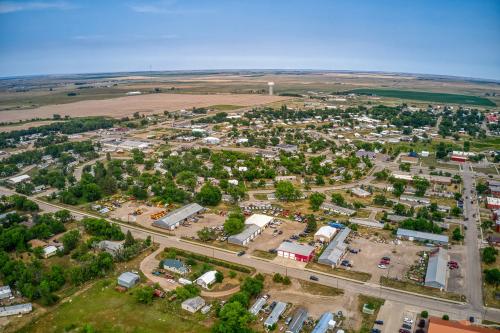
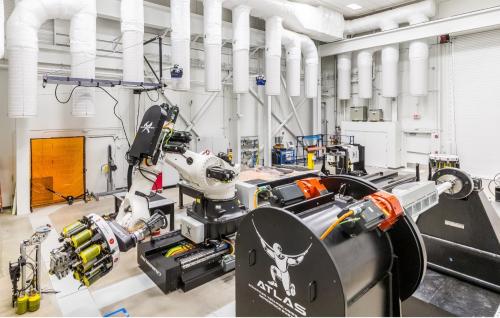
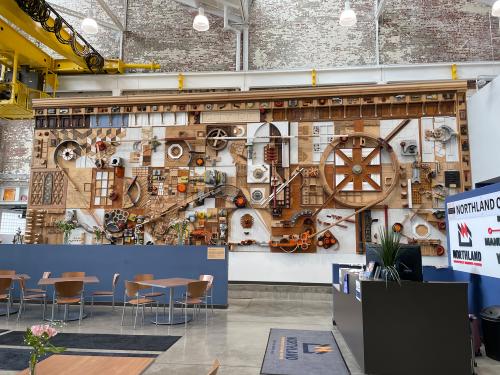
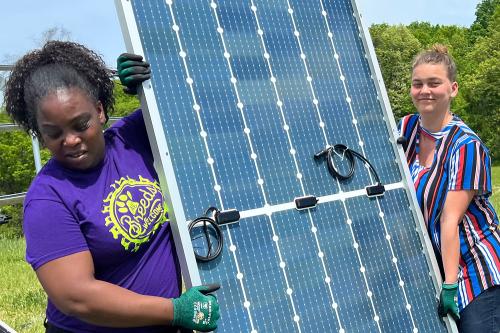
-
Acknowledgements and disclosures
The Brookings Institution is a nonprofit organization devoted to independent research and policy solutions. Its mission is to conduct high-quality, independent research and, based on that research, to provide innovative, practical recommendations for policymakers and the public. As such, the conclusions and recommendations of any Brookings publications are solely those of its authors, and do not reflect the views of the Institution, its management, or other scholars.
Brookings recognizes the value it provides in its absolute commitment to quality, independence, and impact. Activities supported by its funders reflect this commitment.
The authors thank Alex Jones, Bernadette Grafton, Ilana Valinsky, Ryan Zamarripa, Suyog Padgaonkar, Scott Andes, and Justin Tooley from the Economic Development Administration for their insights into the Build Back Better Regional Challenge and for their guidance throughout the development of this case study. For their comments and advice on drafts of this paper, the authors also thank our colleagues Robert Maxim and Mayu Takeuchi, as well as Sara Imhof, Bill Bullock, Katie Stember, Laura Rowley, Hee-Sook Song, Mark Phillips, Dasiané Branch, Monica Lassiter, Andrew George (North Carolina Biotechnology Center), William Smith (North Carolina Central University), and Erica Vilsaint (North Carolina Community College System). The authors also thank all local leaders, community-based organizations, economic development practitioners, regional intermediaries, higher education institutions, industry representatives, and other coalition members who participated in informational interviews and site visits throughout this project, and who provided feedback on the research insights and policy recommendations detailed in this report.
This report was prepared by Brookings Metro using federal funds under award ED22HDQ3070081 from the Economic Development Administration, U.S. Department of Commerce. The statements, findings, conclusions, and recommendations are those of the author(s) and do not necessarily reflect the views of the Economic Development Administration or the U.S. Department of Commerce.
About Brookings Metro
Brookings Metro collaborates with local leaders to transform original research insights into policy and practical solutions that scale nationally, serving more communities. Our affirmative vision is one in which every community in our nation can be prosperous, just, and resilient, no matter its starting point. To learn more, visit www.brookings.edu/metro.
-
Footnotes
- Economic Development Administration. “FY 2021 American Rescue Plan Act Build Back Better Regional Challenge Notice of Funding Opportunity (NOFO) (ARPA BBBRC NOFO).” U.S. Department of Commerce. https://www.eda.gov/arpa/build-back-better https://www.eda.gov/arpa/build-back-better
- Ibid.
- Lightcast 2022. Data includes workers employed in NAICS 54171 – Research and Development in the Physical, Engineering, and Life Sciences and NAICS 32541 – Pharmaceutical and Medicine Manufacturing.
- Companies currently participating in the NC Life Sciences Apprenticeship Consortium include: Amgen, Biogen, Catalent, CSL Seqirus, Fujifilm Diosynth, KBI, Körber Pharma, Eli Lilly, Merck, Novartis, Novozymes, Novo Nordisk, and Pfizer.
- In total, 12 community colleges in the NCCCS offer BioWork: Alamance Community College, Caldwell Community College and Technical Institute, Central Carolina Community College, Craven Community College, Durham Technical Community College, Johnston Community College, Piedmont Community College, Pitt Community College, Rowan-Cabarrus Community College, Vance-Granville Community College, Wake Technical Community College, and Wilson Community College. However, Craven Community College, Piedmont Community College, and Rowan-Cabarrus Community College are not directly engaged with the NCCCS’s work in the Accelerate NC coalition. Furthermore, while Forsyth Tech Community College is a BBBRC sub-awardee of NCCCS, they offer other life sciences workforce training programming—not the BioWork certificate.
The Brookings Institution is committed to quality, independence, and impact.
We are supported by a diverse array of funders. In line with our values and policies, each Brookings publication represents the sole views of its author(s).




